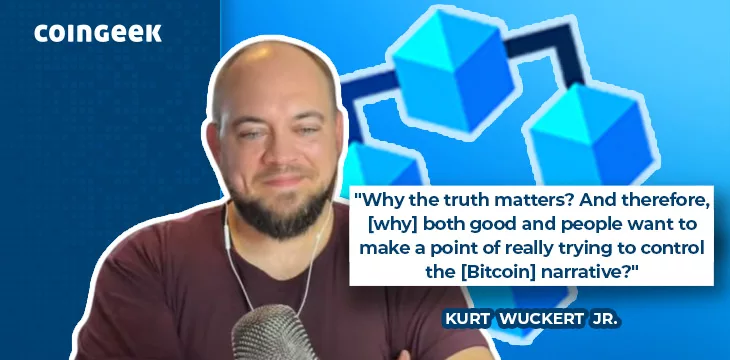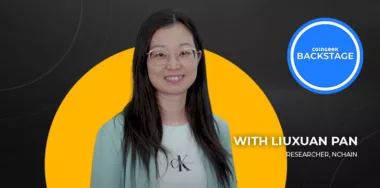Podcaster and fitness influencer Gavin Mehl recently interviewed CoinGeek’s Chief Bitcoin Historian Kurt Wuckert Jr. They talked about how Bitcoin can help preserve history and what’s going to happen in the COPA v Wright trial in January 2024.
Wuckert’s latest article and the importance of history
Wuckert has been releasing deep, thought-provoking articles on CoinGeek for a while. One of his recent ones, dated November 14, was related to how Bitcoin can help us create a verifiable record of what has happened historically.
In ‘History is written by those who hang the heroes,’ Wuckert explores the difficulty of verifying the narratives presented as history. From William Wallace and Robert the Bruce in the quest for freedom in Scotland to the type of character George Washington really was, to unexplored decades of American history and even Bitcoin itself, Wuckert makes the case that a lot of what we believe are carefully woven narratives and partial myths. We’d all be a lot better off if we could verify the actual truth on the blockchain—something the BSV blockchain makes possible.
Giving an example of how blockchain technology could help us verify the truth, Wuckert looks to his own work as Chief Bitcoin Historian at CoinGeek. Characters like Gavin Andresen, who he describes as a “good man,” and Mike Hearn, who personally talked with Satoshi early on, have been either maligned or conveniently forgotten in many ways.
Yet, what they had to say and what they did are important points in the history of Bitcoin. For example, Hearn tried to make Bitcoin XT work with an adjustable block size and was so heavily DDoS’d that a whole ISP in England went down. Wuckert points out that, technically, this was an act of terrorism, yet those researching the history of Bitcoin today will have to dig deep to find out how it happened. A verifiable record of these events on the blockchain would make the truth easier to discover.
What’s really at stake here? The truth itself, and that matters, Wuckert says. People want to control narratives because they win wars. He gives the example of the current conflict in the Middle East between Israel and Palestine; it’s difficult for anyone who isn’t present there to find out what is happening. FOX and CNN aren’t going to give unbiased, factual news.
It’s possible to erase history, Wuckert says, and we need to prevent that. We need to be able to look back at a specific period of time and discover who people were, what they thought, etc. Bitcoin gives us an immutable audit trail of everything that has happened. It can also help people prove their identity and credentials if they have to flee their countries. A global attestation of everything solves so many problems, he says.
Is Bitcoin preserving history right now? Wuckert gives the example of Weather SV. While critics laughed it off as a “weather app,” it’s a lot more; it timestamps raw climate data on the blockchain. This has the potential to depoliticize climate change, making the data available and accessible to all and preventing the sort of data losses that have happened before. Getting the most data possible over the longest period of time would increase trust and transparency.
COPA v Wright and pending cases
Mehl then turns his attention to COPA v Wright and the other cases linked to it. He asks Wuckert to give his thoughts on what to expect.
Wuckert says he isn’t aware of anything that isn’t already public. However, at its core, COPA v Wright is about intellectual property. COPA members allege they want everything to be free and open for everyone, but considering these members involve people like Mark Zuckerberg and Jack Dorsey, that’s unlikely.
Why would such powerful players want to spend so much time and money suing someone they have painted as a goofy fraud? It’s all about issuer rights; if Dr. Wright is Bitcoin’s inventor, that will give him rights preventing them from controlling the Web 3.0 toll booths. They need to discredit him as Satoshi to achieve their goals, but it’s “a Hail Mary on top of a Hail Mary” that is going to be exceedingly difficult for them to win.
COPA is already doing victory laps, Wuckert says. However, he believes they’re going to lose. It’ll be extremely difficult to prove Dr. Wright is not Satoshi. He only needs to introduce the element of doubt to win, and while there are allegedly some inconsistencies in some documents, it only takes one verified email or file for him to win. Whatever he has, it’s perceived by these major players as dangerous enough that they have to try and destroy him.
After COPA, will things immediately go over to the copyright issues? How will this case impact the BTC Core case?
Mehl asks how this case will impact some of the others it is a predicate to. Wuckert tells us that everyone who Dr. Wright is in a legal dispute with has collectivized to use COPA as a predicate case. Dr. Wright confidently agreed to this, leading Wuckert to think he’s either going to win or had one of the best poker faces ever.
If COPA can prove Dr. Wright is not Satoshi, all the other cases become nonsensical. However, if he wins, there will be further litigation. Multiple cases have to be settled, and this case will have an impact on many of them, and they’ll likely be wrapped up quickly.
On a personal level, Wuckert really wants to see the evidence. He’d love to see something irrefutable like the Bitcoin.org purchase receipt or a certified copy of Dr. Wright’s dissertation with lines similar to the Bitcoin white paper. This evidence hasn’t been produced in a satisfactory way so far.
To hear Wuckert’s thoughts on Bitcoin mining, identifying Satoshi’s coins using the blockchain, and whether BSV could ever really flip BTC, listen to the interview through this link. Don’t forget to subscribe to CoinGeek for more content like this!
Watch: Kurt answers blockchain & Bitcoin questions
New to blockchain? Check out CoinGeek’s Blockchain for Beginners section, the ultimate resource guide to learn more about blockchain technology.










